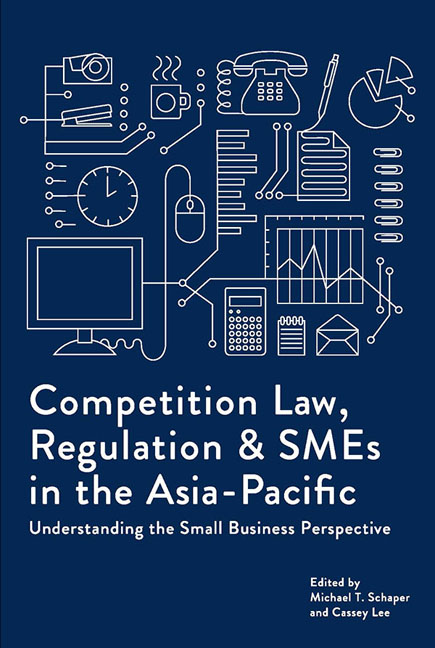 Competition Law, Regulation and SMEs in the Asia-Pacific
Competition Law, Regulation and SMEs in the Asia-Pacific Book contents
- Frontmatter
- Contents
- Foreword
- About the Contributors
- 1 Introduction: Making the Invisible SME More Visible in Competition Policy and Law
- Section 1 Theories And Basic Concepts
- 2 Smes, Competition Law, and Economic Growth
- 3 Competition Policy and Sme Policy: Strange Bedfellows?
- 4 The Competitive Experience of Uk Smes: Fair and Unfair
- 5 Competition Regulator Engagement with the Small Business Sector
- 6 Developing Online Competition Law Education Tools for Smes
- Section 2 Smes And Competition Law
- Section 3 Country Studies
- Index
4 - The Competitive Experience of Uk Smes: Fair and Unfair
from Section 1 - Theories And Basic Concepts
Published online by Cambridge University Press: 05 August 2017
- Frontmatter
- Contents
- Foreword
- About the Contributors
- 1 Introduction: Making the Invisible SME More Visible in Competition Policy and Law
- Section 1 Theories And Basic Concepts
- 2 Smes, Competition Law, and Economic Growth
- 3 Competition Policy and Sme Policy: Strange Bedfellows?
- 4 The Competitive Experience of Uk Smes: Fair and Unfair
- 5 Competition Regulator Engagement with the Small Business Sector
- 6 Developing Online Competition Law Education Tools for Smes
- Section 2 Smes And Competition Law
- Section 3 Country Studies
- Index
Summary
Although there has been a considerable amount of research undertaken on the impact of competition policy upon (large) enterprises and upon consumers, there is almost no empirical work that examines any link between competition policy and small and medium-sized enterprises (SMEs). This chapter addresses this issue. It finds that one third of firms are aware of anti-competitive practices such as price fixing, cartels, and tender agreements and one quarter have actually been a victim of such practices. Its second key finding is that among SME “victims”, the most likely response is to “shrug their shoulders and get on with it”. The third key finding is that this reaction is considerably less likely amongst male owners of larger SMEs who have a degree-level qualification. This implies the competition authorities have to recognize that many SMEs are the victims of anti-competitive behaviour, but the latter's response to this reflects the diversity that characterizes the SME population.
Introduction
Competition policy, as framed by governments, is directed towards those firms with “market power”. Because large firms are more likely than small firms to be able to influence market prices, it is the former that have been the focus of attention of national, and sometimes international, competition authorities.
The prime role of competition policy, certainly in the United Kingdom, has been to seek to benefit consumers, and to have large firms as its key target. In contrast, small and medium-sized enterprises (SMEs) are viewed as more likely to be the victims, rather than the perpetrators, of anti-competitive practices.
So, although there has been considerable research undertaken on the impact of competition policy upon (large) enterprises and upon consumers (see Motta 2004 for a review), there is almost no UK-based work that examines any link between competition policy and SMEs.
Small and Large Firms
Storey and Greene (2010) argue that, other than pure scale, SMEs are different from larger enterprises in several important respects. First, SMEs normally lack any form of market power. In other words, by changing their output, they are unable to influence prices in their marketplace. Second, SMEs are very unlikely to be able to restrict or eliminate the entry of new firms in their markets. So, if they develop a profitable niche, it is very unlikely that they will be able to prevent another firm entering that marketplace to compete against them.
- Type
- Chapter
- Information
- Competition Law, Regulation and SMEs in the Asia-PacificUnderstanding the Small Business Perspective, pp. 65 - 84Publisher: ISEAS–Yusof Ishak InstitutePrint publication year: 2016


